Horasis India Meeting 2024 – Summary
The 16th Horasis India meeting took place in Athens, the capital of Greece over 15 – 16th September, co-hosted by the Hellenic-Indian Chamber of Commerce and Economy. The Horasis India Meeting has become the foremost annual meeting of Indian business leaders and their global counterparts to discuss a wide range of issues related to the Indian economy. This year’s meeting offered an ideal platform for over 300 senior business leaders from India, Greece and the rest of the world to explore and foster cooperation, impact investing, and sustainable growth.
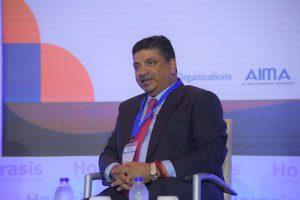
Palanivel Thiaga Rajan, Minister for Information Technology & Digital Services, Government of Tamil Nadu, keynoting the Horasis India Meeting
The main thematic pillars of the meeting are international economic cooperation, impact investing and sustainable growth. The aim of the meeting was for participants to present innovative ideas and interesting proposals via discussion panels, plenary sessions and informally regarding the development of ESG strategies, the future of infrastructure in Greece and India, and the development of SMEs. Of particular interest were the discussions on the broader prospects of the economies, the long-term bilateral relations between Greece and India, and the transformation of Athens into an emerging business investment hub in Europe: India’s position as a global growth driver will be analysed.
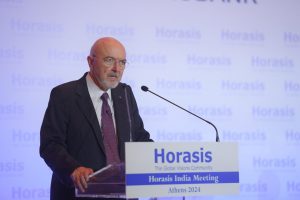
Kostas Fragogiannis, Deputy Minister of Foreign Affairs, Greece on the emerging Greek-Indian partnership
The Horasis India Meeting serves as a strategic convergence hub between key actors in the public sphere. Constituting an ideal framework for multi participatory dialogue, the meeting will see a constructive exchange of views. Kostas Fragogiannis, Deputy Minister of Foreign Affairs, Greece opined that Greece stands as a pillar of stability and prosperity in the wider Southeast Mediterranean region and serves as a significant gateway to the European market. For instance, after the Russian invasion of Ukraine, a better North-South connectivity was thought necessary. To this end, the Three Seas Initiative (3SI) between the Baltic, Black and Adriatic Seas was created by many Central and Eastern European states representing a third of the European Union. They will concentrate upon purpose driven innovation projects. The 3SI Innovation Fund will facilitate further accords in the areas of transport, energy, military mobility, and digitalization within the Three Seas region and beyond – with regional, transatlantic partners and now, Indian partners. Its standing in the 3SI accord and in the newer IMEEC (India-Middle East-Europe Economic Corridor) is supported by the two Heads of State – Prime Minister Kyrios Mitsotakis when he visited India last February and by Prime Minister Narendra Modi when he visited Greece in August 2023. They have both avowed that the Middle East conflict will not holdup developments within IMEEC – yet a resolution of that conflict is needed since Haifa port in Isreal, owned by Adani Group, is seen as an important eastern Mediterranean service point.
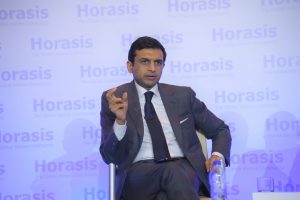
Summit co-chair Vineet Agarwal, Managing Director, Transport Corporation of India
Vineet Agarwal, Managing Director, Transport Corporation of India, India noted India is on the cusp of massive change – it will be a lifetime opportunity. It is investing 3.5% GDP on infrastructure/yr which will have a large trickle-down effect – it will be a good attractor for Greek firms to come in larger numbers. It is Greece that holds the promise of being a strong hub and gateway into Europe for a variety of commercial activities further enhancing their present trade interchanges. The governments of Greece and India have drafted a partnership agreement with the goal of doubling their bilateral trade from nearly USD $2 billion in 2022-2023 to USD $4 billion by 2030. Fokion Karavias, Chief Executive Officer, Eurobank, Greece informed the meeting that Greece is good at networking for the flow of goods (IMEEC), for data (there are new venture in long distance phone/data links) and via the developing data centres, and for the exchange of knowledge. He noted that Cyprus is also welcoming Indian firms as it presents many business attractions. To help these innovations we must ensure that all Chambers of Commerce talk to each other.
George Karayiannis, Managing Partner, Karayiannis Energy Law Consultancy, Greece stressed the need to utilize cross-disciplinary approaches to address policy, strategic and operational issues with strong team players, with demonstrated ability to lead cross-functional, multi-national teams under challenging conditions. Spiro Pappas, Chairman, Atlas Iron, Australia stressed “firms in trade corridors should help prepare our citizens to reskill.” That was agreed by Preetha Reddy, Vice Chairperson, Apollo Hospitals; Past President AIMA, India who works closely with over 13,000 clinicians within the organization. She introduces contemporary protocols to continuously enhance clinical outcomes. And she is convinced that technological advancements like AI can alleviate long-standing issues in the healthcare sector, such as the lack of skilled workforce, in order to help improve access to healthcare.
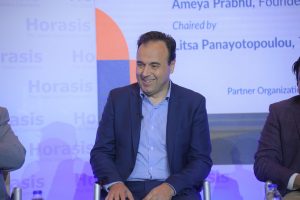
Dimitris Papastergiou, Greek Minister of Digital Governance
India’s strategic location in the Indian Ocean and Greece’s position as a gateway to Europe make collaboration between their ports essential. And also, to enable processes and policies to make oceans cleaner and more sustainable said Dionysia-Theodora Avgerinopoulou, Prime Minister’s Envoy for the Ocean, Greece. In creating compromises, we must move beyond differences. She noted that governments implemented regulations but they did not take many measurements – and this is what ESG is now causing us to do and to a common standard. Greece, as a huge maritime nation, has developed ESG specifically for the global shipping and supply chain sector. Hemakiran Gupta, Regional Head, Banking and Financial Services Europe, TCS, Belgium, leading the plenary addressing progress ‘Towards a Clearer Implementation of ESG’ reminded us that “outdated legacy systems stand in the way of progress. Legacy was at the heart of the business, but it was built for a different era” and went on to stress that we must have strong leadership Commitment: Sustainability initiatives in universities / institutions /corporates that must start with the Board and Presidents committing to a sustainable vision. The strong leadership process was outlined by Nasser Munjee, Chairman, Tata Motor Finance, India – we have a stated sustainability objective “of being a socially responsible corporate aiming to improve the quality of life in the communities we serve.”
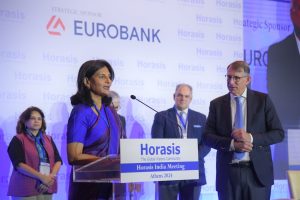
Preetha Reddy, Vice Chairperson, Apollo Hospitals, India
Rupa Vasudevan, Chancellor, BEST Innovation University, India also emphasized the need to manage ESG from the top, noting how her young university that was specializing on human capital across the agricultural sector. They have created a 50-year road map incorporating ESG in their business model and in their teaching, and co-opted teaching into community life – so they live in a green oasis in an arid land. This develops measurable success. Aditi Haldar, Director, Global Reporting Initiative, India agreed that “The silos of environment, social and governance need more interconnectivity.” The GRI provides the vital interchange between report creators and report users so that sustainability reporting can move not only a business entity, but also an economy towards prosperity with responsibility.” Eventually, the global ESG standards will trickle down to their SMS and getting them initially compliant, then to think their business in terms of ESG.
Shishir Priyadarshi, President, Chintan Research Foundation, India worries that there is still too much left-over influence of the British Raj mindset – “it would be better to elevate local voices, support a culture of self-reliance and indigenous frameworks.” And taking up the hopes of Nasser Munjee, he hopes the local mind-set will incorporate ESG parameters in their business plans. More broadly the reciprocal visits between Greek and Indian heads indicate a new strength in the political will. First, in terms of making IMEEC work, ports have to be developed beyond a logistics center to one of being a center of economic development. Dimitri Avramopoulos, Former EU Commissioner, Former Minister of Foreign Affairs, Greece said “Managing these migratory flows cannot happen in a one-size-fits-all manner.” People who have the right to claim asylum, must be allowed to exercise it. But those who abuse the asylum system or come illegally without a valid right to stay, should be sent back. Anil Wadhwa, Former Secretary, Ministry of External Affairs; India illustrated how strongly the Indian government is supporting its growth agenda. He noted some while ago that Reforms have been enacted in the mining, health care and pharmaceuticals, IT, infrastructure, defence, space, agriculture, medium and small enterprises, financial and banking sectors. Tasos Anastasatos, Chief Economist, Eurobank, Greece reminded us that the global economy is undergoing swift changes – inflation is generally reducing. But growth has slowed, especially in Euro-zone, though no deep recessions are expected, though fiscal debts will remain high. India has invested in human services so long-term growth looks assured. There is a lot of scope for joint accords leading, hopefully, to focussed projects, not waffle.
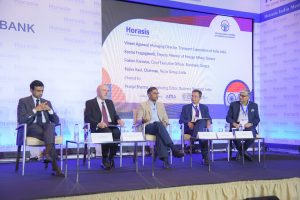
Opening Plenary – India Blossoms after its Elections
Throughout the meeting there were many discussions about AI and the state of digitisation. In the plenary Accelerating the State of Digitalization led by Litsa Panayotopoulou, Founder and CEO, E.VI.A Intelligent Performance, Greece, said she was pleased that Greece now has a Ministry of Digital Governance – which suggests portents for the future. Yet Dimitris Papastergiou, Minister of Digital Governance, Greece described the reforms of the Greek bureaucracy, “…which has plagued generations of Greeks and provided material for countless plays and movies and which could only be considered a scene from… science fiction.” Greece is now rapidly digitizing, and entering dynamically into the era of Artificial Intelligence, noting that “the citizen will access the government… from his mobile phone.” Minister Papastergiou has launched the Digital Assistant to permit all aspects of Greek public service to be reached digitally. Palanivel Thiaga Rajan, Minister for Information Technology & Digital Services, Government of Tamil Nadu, India explained that Tamil Nadu has the second largest economy of a State in India, targeting double digit growth rates and making it India’s ideal investment destination. Digitalization in particular has been leading to employment generation and enhanced economic development.
Vanitha Datla, Vice Chairperson & Managing Director, Elico Healthcare Services, India is a champion of diversity, inclusion, and women empowerment. She noted how digitisation has freed up much of her home life – if she has forgotten an ingredient for making dinner, she only needs to access the Web for almost instant delivery directly to her home. However, this is in Hyderabad, a city with approximately the same population as the whole of Greece. IT is more penetrating in India than Greece as it started earlier. Vinod Kumar Wuthoo, President, India SME Forum, India says that the missing 1.4 billion people need many services. These are the people missed, for many reasons from Aadhaar.
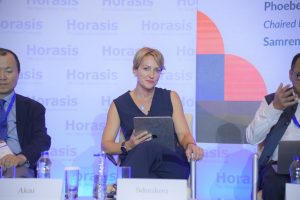
Alexandra Sdoukou, Deputy Minister of Environment and Energy, Greece
Perhaps they are extremely poor, infirm or simply old and do not comprehend the nature of a smartphone. They must be digitized to enable the flows of all services. To permit connection to those left out of digitization India has set up 400,000 remote service centers serving the 65% of population which is rural, and so the relatively deprived are helped: each new interaction in the service center will create a new digitization (and aid) for the previously unconnected person, so enabling access to all the digitized state aid. Ameya Prabhu, Founder, NAFA Capital, thinks India has reduced bureaucracy and so increased democracy through its total digitization. In comparison with the US with its manual voting system, India has been digitized for 25 years. Even if a remote rural person has had to travel through forest for 3 days, their vote is digitally registered and available for instant aggregation. And with all this IT India can say it is now truly democratic and far less corrupt.
Rhett Power, Forbes Columnist & Chief Executive Officer, Accountability Inc, USA led the closing plenary on Supporting Cross-border Entrepreneurship. He noted how the root of many problems within our companies can often be found within ourselves. As leaders and decision-makers, our choices and actions can profoundly impact the organization. Acknowledging this reality is the first step towards effectively addressing and resolving these challenges. This was a sentiment echoed by Sri Krishnaji, Co-founder, Ekam – World Centre for Enlightenment, India who works across 100 nations and people from round the world who come to India to learn from Ekam.
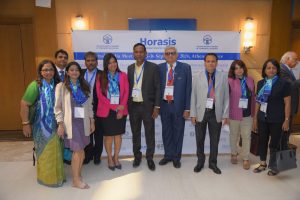
Participants gather prior to a session
He said we “…should move away from the my-pleasures (working for oneself) to being purposeful (for others). And move from being competitive to cooperative (being competitive keeps one in me-ism). Thus, we should disengage from one’s ego to be free of me-ism and thus become responsible towards others.” Preity Üpala, Founder, The Omnia Institute, India believes there is a great opportunity arising from this meeting as both Indians and Greeks realise how similar they are based on thousands of years of history – AI: ancestral intelligence. Greece is a natural gateway to Europe and India is a gateway to the global north/south.
Murat Seitnepesov, President, Greater Caspian Association, Switzerland reflected on decisions about three years ago when we decided that we should do something good for our region looking beyond Turkmenistan where I was born. He explained “I see many opportunities for Greece to benefit from new partners in the Caspian; and by extension, India as well.” Rajive Kaul, Chairman, Nicco Group, India in a sense, summarized the meeting. He affirmed the Indian and Greek governments and businesses need to engage and encourage cross-border collaboration raising investments through their Chambers of Commerce since both nations have good niche start-ups. Many aspects of Indian/Greek accords must comply with the EU if the trade from India is to pass into Europe through a Greek hub.

Summit co-chair Fokion Karavias, Chief Executive Officer, Eurobank, Greece
Dora Bakyoannis, Former Minister of Foreign Affairs, Greece who had he honor of being elected World Mayor in 2005 addressed the closing inner: Celebrating Greek-Indian Relations. She said Greece invented democracy and at the same time invented populism. We now have to be honest, open, transparent and determined to get the Greeks and everyone else out of their crises: “Today in Greece we are working together closely for a stable and progressive southeast Europe; and we cooperate in every major international challenge, from Afghanistan to natural disasters.”
The 2024 edition of the Horasis India Meeting has illustrated how cooperation between the host nation, Greece, and India is developing synergies for the future. Horasis looks forward to welcoming you again next year to an equally fruitful edition of the Horasis India Meeting.



